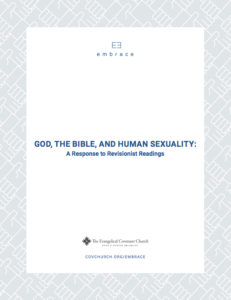Embrace
Embrace
![]()
Head | Embrace Understanding
Grow in biblical and theological understanding
This section offers resources to help you embrace a deeper understanding of human sexuality in four distinct categories: biblical, theological, historical, and understanding. Resources are recommended here to help you develop a healthy comprehension of and dialogue around the complexities of faith, gender, and sexual identity in harmony with the adopted position of the ECC. The center of which is “faithfulness in heterosexual marriage, celibacy in singleness—these constitute the Christian standard.”
I. Featured
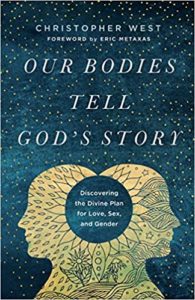
Our Bodies Tell God’s Story
By Christopher West
Christopher West, a Catholic theologian, explores Pope John Paul II’s theology of the body and offers helpful insights into the mystery of sex and marriage through the lens of the Imago Dei (Image of God). Ultimately, West argues that marriage is a sacramental sign that invites onlookers to witness our mysterious call to union with God. On a grand scale, West explains, “marriage was designed by God to teach human creatures what human history is really all about” – the marriage of humanity to God. While keeping in mind its Catholic perspective—expressed particularly through its final chapter on contraception—the strength of this resource is that it reflects on precisely how marriage between male and female “tells God’s story” in a unique and incomparable way.
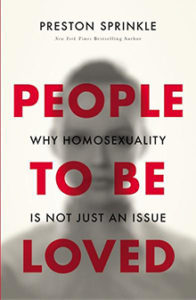
People to Be Loved: Why Homosexuality Is Not Just an Issue
By Dr. Preston Sprinkle
In the midst of contemporary debates about homosexuality, Christians are looking for resources that are based solidly on a thorough study of what Scripture says. In People to Be Loved, Dr. Preston Sprinkle takes this deep dive into the Scriptures, rigorously engages with diverse interpretations, and ultimately upholds the validity of the traditional sexual ethic of heterosexual marriage and celibacy in singleness. At the same time, Sprinkle goes deeper. He challenges us with the reality that ultimately homosexuality is not just an issue—it is about people to be loved. Those holding the traditional view of human sexuality must still reconcile the Bible’s prohibition of same-sex relations with the message of the radical, unconditional grace of Jesus Christ. People to Be Loved is a powerful resource that gets us started on the journey.
II. Biblical
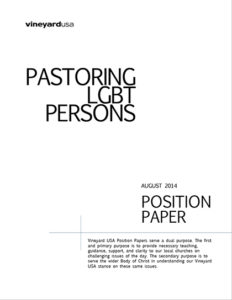
Pastoring LGBT Persons: A Vineyard USA Resource Paper
By Vineyard USA
This paper written by the Vineyard USA denomination is intended to assist pastors as they lead churches and to assist all Christian believers to grow in our ability to engage LGBTQ+ people with the love and grace of Jesus. It is also a position paper which explains the biblical basis of the position of the Vineyard USA on human sexuality. (For a similar ECC resource, see God, the Bible, and Human Sexuality: A Response to Revisionist Readings written by the North Park Theological Seminary biblical faculty).
God, the Bible, and Human Sexuality: A Response to Revisionist Readings
By the Biblical Faculty of North Park Theological Seminary
In cooperation with the Make and Deepen Disciples mission priority of the ECC, the biblical faculty of North Park Theological Seminary have endeavored to write a clear, user-friendly commentary and interpretation on the texts of the Bible that explicitly address same-sex sexual relations. This paper also engages with and responds to a number of recent revisionist readings of the biblical texts, ultimately undergirding the traditional sexual ethic of the historic church and the ECC. We are grateful to these Covenant scholars for devoting their time and effort to complete this work for the edification and flourishing of our church.

People to Be Loved: Why Homosexuality Is Not Just an Issue
By Dr. Preston Sprinkle
In the midst of contemporary debates about homosexuality, Christians are looking for resources that are based solidly on a thorough study of what Scripture says. In People to Be Loved, Dr. Preston Sprinkle takes this deep dive into the Scriptures, rigorously engages with diverse interpretations, and ultimately upholds the validity of the traditional sexual ethic of heterosexual marriage and celibacy in singleness. At the same time, Sprinkle goes deeper. He challenges us with the reality that ultimately homosexuality is not just an issue—it is about people to be loved. Those holding the traditional view of human sexuality must still reconcile the Bible’s prohibition of same-sex relations with the message of the radical, unconditional grace of Jesus Christ. People to Be Loved is a powerful resource that gets us started on the journey.
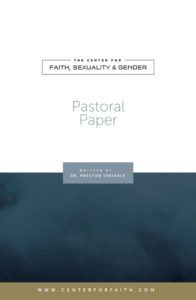
The Center for Faith, Sexuality and Gender: 15 Affirming Arguments: And 15 Responses
By Dr. Preston Sprinkle
Does the Bible really say that same-sex sexual relations are sin? Is marriage only between a man and a woman, or can a Christian view of marriage be extended to include same-sex couples? There are many reasons why some Christians believe that monogamous, consensual, same-sex relations are not prohibited by Scripture. In this paper, Dr. Preston Sprinkle summarizes and responds to 15 of those reasons.
Free PDF available now
By clicking this link, you’ll be asked to provide your Last Name, Email, City, and Zip/Postal Code to The Center for Faith, Sexuality & Gender.

The Center for Faith, Sexuality and Gender: A Biblical Conversation About Transgender Identities
By Dr. Preston Sprinkle
This paper seeks to understand what the Bible says about the human identities of male and female as they relate to questions about transgender (and non-binary) identities. The focus of this paper is on what the Bible says and doesn’t say, while interacting with the most salient trans-affirming biblical arguments. It concludes by offering some brief responses to some of the most pressing pastoral/ethical questions facing Christian leaders in the church.
Free PDF available now
By clicking this link, you’ll be asked to provide your Last Name, Email, City, and Zip/Postal Code to The Center for Faith, Sexuality & Gender.

The Center for Faith, Sexuality and Gender: Did adult, consensual same-sex relations exist in Bible times?
By Dr. Preston Sprinkle
The biblical prohibitions against same-sex relations were given against a cultural backdrop that including many different kinds of same-sex relations. Some scholars have recently argued that adult, consensual same-sex relations didn’t exist in biblical times. This paper examines many different references to adult, consensual relations in Ancient Near Eastern, Greco-Roman, and Jewish texts, in order to show that the biblical prohibitions shouldn’t be limited to non-consensual relations.
Free PDF available now
By clicking this link, you’ll be asked to provide your Last Name, Email, City, and Zip/Postal Code to The Center for Faith, Sexuality & Gender.

The Center for Faith, Sexuality and Gender: Why Didn’t Jesus Mention Homosexuality?
By Dr. Preston Sprinkle
Jesus never explicitly mentioned homosexuality in the four gospels of the New Testament. He talked about fornication, adultery, lust, marriage, divorce, and other aspects of sexuality. But he never mentioned same-sex sexual relations.
Free PDF available now
By clicking this link, you’ll be asked to provide your Last Name, Email, City, and Zip/Postal Code to The Center for Faith, Sexuality & Gender.

The Center for Faith, Sexuality and Gender: Is Same-Sex Attraction (or Being Gay) a Sin?
By Nate Collins and Greg Coles
Is being gay a sin? We argue that the answer to this question is “no.” Simply being gay in sexual orientation is no more or less sinful than being straight. Our attractions and orientations don’t make us sinful or holy—it’s what we do with our attractions and orientations, the way we steward our sexuality, that counts in the eyes of God.
Free PDF available now
By clicking this link, you’ll be asked to provide your Last Name, Email, City, and Zip/Postal Code to The Center for Faith, Sexuality & Gender.
III. Theological

The Center for Faith, Sexuality and Gender: The Bible, Polyamory, and Monogamy
By Dr. Branson Parler
What do you say when someone asks, “Is your church accepting of poly people? Does the Bible really say that marriage is between one man and one woman? What about all the marriages in the Old Testament that didn’t follow this paradigm? If God accommodated to polygamous relationships in the Old Testament, can we accommodate to polyamorous relationships today? Why, or why not?” This new resource paper from the Center for Faith, Sexuality, and Gender addresses these questions and more.
Free PDF available now
By clicking this link, you’ll be asked to provide your Last Name, Email, City, and Zip/Postal Code to The Center for Faith, Sexuality & Gender.
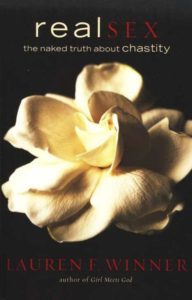
Real Sex: The Naked Truth About Chastity
By Lauren Winner
This work speaks candidly to Christians about the difficulty—and the importance—of sexual chastity. With honesty and wit, Lauren Winner writes about her own journey with chastity. Never dodging tough terms like “confession” and “sin,” she grounds her discussion in Scripture. Winner confronts cultural lies about sex and challenges the privatization of sex in today’s culture, arguing that “Because sex forms us, sex is a community matter.” Calling chastity a spiritual discipline to which every Christian is called, she offers observations and suggestions that are especially valuable to unmarried Christians struggling with the sexual mania of today’s culture. Real Sex is essential reading for Christians grappling with chastity and a valuable tool for pastors.
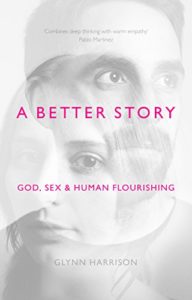
A Better Story: God, Sex and Human Flourishing
By Glynn Harrison
When people think of Christianity and sexuality today, what often comes to mind is a series of prohibitions. This, of course, is less-than-inspiring. In this excellent work, Glynn Harrison argues that if Christians still believe that we have good news in the sphere of sexual ethics, then we must offer “a better story”—one that fires the imagination. He challenges readers to understand and communicate a more compelling vision of human flourishing and sexuality that moves beyond our “no” to clearly cast a vision for our “yes.” Rooted in Scripture, hope, and a recommitment to the value of community in an age of excessive individualism, this book reminds us that God’s story is always the most beautiful story.
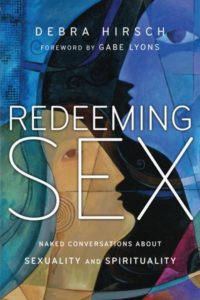
Redeeming Sex: Naked Conversations about Sexuality and Spirituality
By Debra Hirsch
What does sexuality have to do with spirituality? In this insightful and often humorous work, Debra Hirsch explores this question through a combination of theological reflection and stories from her own past experiences of sexuality—both lesbian and straight. She observes, “If we are created in the image of God, then our sexuality reflects something of who God is…. How we understand and live out our sexuality is profoundly important because we will either reflect our Creator or not.” Hirsch invites readers to consider how “centered-set” rather than “bounded-set” discipleship approaches may be more helpful when it comes to engaging LGBTQ+ people in the church; she also advocates for “leading with embrace.”
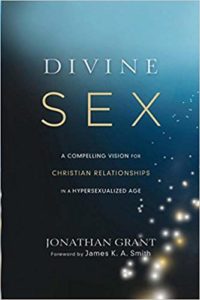
Divine Sex: A Compelling Vision for Christian Relationships in a Hypersexualized World
By Jonathan Grant
In Divine Sex Jonathan Grant sets out to, “describe the significant ways in which our cultural lens is shaping our identity and relationships and how we can refocus the church’s vision through the lens of the gospel.” Grant masterfully maps the modern hypersexualized world we live in drawing from multiple fields of discipline. He examines the consequences of a culture that has placed authenticity, liberty, consumerism and the self as its primary formational voices around sexuality and relationships. One area of this work that may challenge us in the Covenant is that Grant may be closer to our Catholic friends on the intersection of sex and procreation. However, his critique that the modern evangelical church has often wrongly and too quickly severed sex from its procreative design is something to honestly wrestle with. Grant’s book is different and needed because he does not stop at critique. Rather, he suggests how a Christian worldview can offer a better vision for all of us, for all our relationships.

Our Bodies Tell God’s Story
By Christopher West
Christopher West, a Catholic theologian, explores Pope John Paul II’s theology of the body and offers helpful insights into the mystery of sex and marriage through the lens of the Imago Dei (Image of God). Ultimately, West argues that marriage is a sacramental sign that invites onlookers to witness our mysterious call to union with God. On a grand scale, West explains, “marriage was designed by God to teach human creatures what human history is really all about” – the marriage of humanity to God. While keeping in mind its Catholic perspective—expressed particularly through its final chapter on contraception—the strength of this resource is that it reflects on precisely how marriage between male and female “tells God’s story” in a unique and incomparable way.
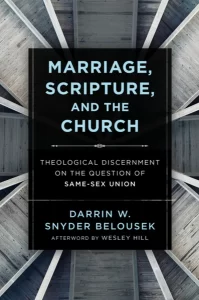
Marriage, Scricture, and the Church: Theological Discernment on the Question of Same-Sex Union
By Darrin W. Synder Belousek
This book takes a distinctive approach to the same-sex-union debate by framing the issue as a matter of marriage. Darrin Snyder Belousek demonstrates that the interpretation of Scripture affects whether the church should revise its doctrine of marriage for the sake of sanctioning same-sex union. Engaging charitably yet critically with opposing viewpoints, he delves deeply into what marriage is, what it is for, and what it means as presented in the biblical narrative and the theological tradition, articulating a biblical-traditional theology of marriage for the contemporary church. Afterword by Wesley Hill.
IV. Historical
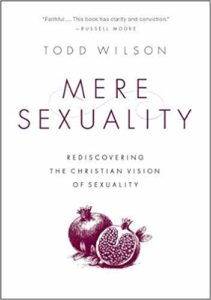
Mere Sexuality: Rediscovering the Christian Vision of Sexuality
By Todd Wilson
In this book, Todd Wilson provides a theological and historical analysis of sexuality from a Christian perspective. His work is thorough yet accessible. Wilson’s work fits well within the Covenant’s ethos and aligns with the Covenant posture toward human sexuality. Appendix 2, “Bent Sexuality,” is written by Joel Willitts, professor of biblical and theological studies at North Park University.
V. Understanding
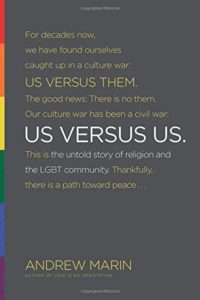
Us Versus Us: The Untold Story of Religion and the LGBT Community
By Andrew Marin
In this work, Andrew Marin presents findings of the largest-ever scientific survey of the religious history, practices, and beliefs of the LGBTQ+ community. This research-based work, based on the results of a survey of over 1,700 LGBTQ+ people, is helpful for parents, pastors, and churches to understand why many LGBTQ+ people have left faith communities and what would persuade them to return. A key finding is that most LGBTQ+ people leave faith communities due to relational, instead of theological, reasons. The problem isn’t usually a church’s traditional stance on marriage, but rather, the church’s posture toward LGBTQ+ people. This book challenges traditional faith communities to learn how to better love and embrace LGBTQ+ people.
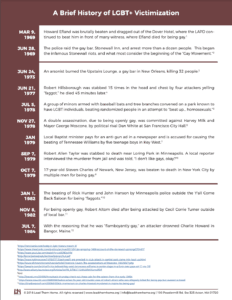
Understanding LGBT+ History
Developing a missional posture — and understanding the depth of need for justice actions — requires a working understanding of the history of LGBTQ+ people.
Gain a brief understanding of LGBT+ historic victimization through this PDF.
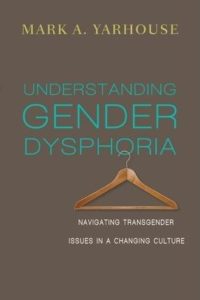
Understanding Gender Dysphoria: Navigating Transgender Issues in a Changing Culture
By Mark Yarhouse
Dr. Mark Yarhouse, a Wheaton-trained psychologist and expert in gender identity, challenges the church to rise above political hostilities and listen to people’s stories. In Understanding Gender Dysphoria, Yarhouse offers a Christian perspective on the transgender experience that eschews simplistic answers and appreciates the psychological and theological complexity. The result is a book that engages the latest research while remaining pastorally sensitive to the experiences of each person. Although the book is academically dense, it is a must-read for anyone engaged in a deeper understanding of gender dysphoria and other gender identity questions. Yarhouse calls Christians to come alongside those on the margins and stand with them as they resolve their questions and concerns about gender identity.
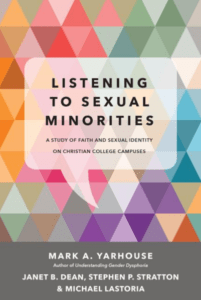
Listening to Sexual Minorities: A Study of Faith and Sexual Identity on Christian College Campuses
By Mark Yarhouse
For sexual minority students on Christian college campuses, faith and sexuality can feel in acute tension. Yarhouse, Dean, Stratton, and Lastoria draw on their decades of experience to bring us a longitudinal study into what sexual minorities experience, hope for, and benefit from. Rich with both quantitative and qualitative data, here is an unprecedented opportunity to listen to sexual minorities in their own words.


